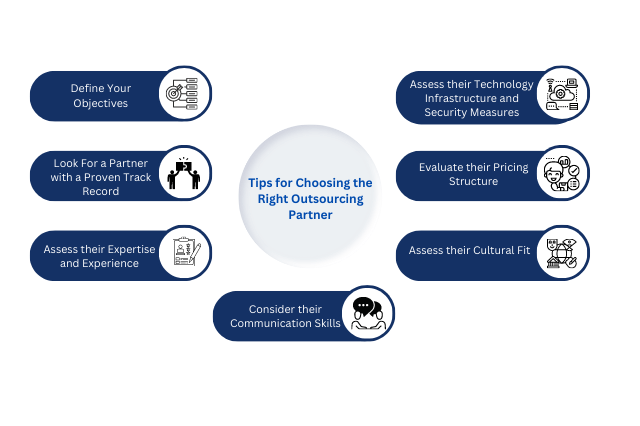How Can Staffing Outsourcing Help You Save Time and Money?

How Can Staffing Outsourcing Help You Save Time and Money?
Every business owner wants to save money and time, the two most important resources. They must also maintain constant vigilance to balance carrying out the firm’s tasks and offering first-rate client service. Time and money can be saved by working more intelligently and not harder.
Many organizations have long preferred to outsource their business operations and solutions. The world is now more profoundly connected to the current technological boom. This has made it possible for small companies to benefit from outsourcing, which has helped them increase sales and profitability.
Outsourcing has several advantages, but cost-effectiveness and time stand out as the most important. It helps businesses save money, simplify job management, and, most importantly, frees up time and resources to concentrate on coming up with original, creative ideas.
5 Ways Outsourcing Business Solutions Can Save You Time & Money
Here are some ways how staffing outsourcing can help you save time and money:

-
Focus on Core Activities
Outsourcing staffing services can allow companies to focus on their core activities and business processes by delegating the recruitment and staffing responsibilities to an external service provider. This can save them time and energy that would otherwise be spent on sourcing, screening, and hiring new employees.
-
Access to Specialized Expertise
A company can gain access to specialized skills and resources through outsourcing that may not be readily available within the company itself. For instance, a company can outsource its information technology (IT) services to a specialist vendor knowledgeable in that field.
By doing so, the business can benefit from the vendor’s expertise and experience, which can help to improve productivity and efficiency.
-
Reduced Overhead Costs
Outsourcing staffing services can help reduce overhead costs by eliminating the need to invest in recruitment infrastructure, such as job boards, recruitment software, and other resources. You can also avoid the costs associated with employee benefits and salaries of in-house recruiters.
-
Faster Hiring Process
Staffing outsourcing companies have a large pool of candidates and a streamlined recruitment process that allows them to fill positions quickly. This can help you save time and money on the recruitment process and reduce the time-to-hire for new employees.
-
Flexibility
It can help you save money by providing flexible staffing solutions that can be adjusted to meet your changing needs. For example, you can use their services only when you need new employees or scale up or down your staffing requirements as your business needs change.
Read More: Everything You Should Know About Staff Augmentation
Tips for Choosing the Right Outsourcing Partner
Choosing the right outsourcing partner is critical to the success of your outsourcing initiative. Here are some tips to help you choose the right outsourcing partner:

-
Define Your Objectives
Defining your objectives and requirements is critical in choosing the right outsourcing partner. By doing so, you can ensure that the partner you choose has the necessary expertise, resources, and capabilities to meet your specific needs and deliver the results you’re looking for.
To define your objectives and requirements, you should first identify the areas where you need support and determine the specific tasks or processes you want to outsource. Next, you should establish clear goals and performance metrics to measure the success of the outsourcing initiative. This can include metrics such as cost savings, productivity improvements, quality enhancements, or other key performance indicators (KPIs) that align with your business objectives.
Once you have established your objectives and requirements, you can evaluate potential outsourcing partners based on their experience, expertise, and ability to meet your specific needs.
-
Look For a Partner with a Proven Track Record
Checking an outsourcing partner’s references and testimonials is an important step in evaluating their track record of success. This can provide valuable insights into their performance, reliability, and ability to deliver quality work.
Additionally, you can conduct your own research by checking online reviews and ratings from other clients who have worked with the outsourcing partner. This can give you a more well-rounded view of their strengths and weaknesses and help you make a more informed decision.
-
Assess their Expertise and Experience
Assessing an outsourcing partner’s expertise and experience is crucial to ensuring they can deliver the desired results. This involves evaluating their skills and experience in the areas where you need support, such as IT, finance, customer service, or other key business functions.
To assess an outsourcing partner’s expertise and experience, you should first identify the specific skills and knowledge required for the tasks or processes you want to outsource. This can involve reviewing job descriptions, conducting a skills gap analysis, or consulting with subject matter experts within your organization.
Once you have identified the required skills and knowledge, you can evaluate potential outsourcing partners based on their expertise and experience. This can include reviewing their resumes, portfolios, case studies, or other relevant materials demonstrating their capabilities and track record of success.
-
Consider their Communication Skills
Communication is a critical factor in the success of any outsourcing relationship. Choosing an outsourcing partner with strong communication skills and a willingness to collaborate and work closely with your team can help ensure that the project runs smoothly and that expectations are met.
To assess an outsourcing partner’s communication skills, you should evaluate their responsiveness and accessibility. This involves determining how quickly they respond to emails, phone calls, or other forms of communication and whether they have a clear process for managing communication throughout the project.
You should also evaluate their ability to understand and address your needs and concerns. This can involve reviewing their project management, quality control, and risk management approach and their willingness to collaborate with your team and provide regular updates on project status and progress.
-
Assess their Technology Infrastructure and Security Measures
Technology infrastructure and data security are critical considerations when choosing an outsourcing partner. Ensuring the outsourcing partner has a robust technology infrastructure and strong security measures is important to protect your confidential data and ensure business continuity.
To assess an outsourcing partner’s technology infrastructure, you should evaluate their hardware and software capabilities, as well as their network and connectivity options. This can involve reviewing their equipment, systems, and platforms, as well as their ability to integrate with your existing IT infrastructure.
It is also important to evaluate an outsourcing partner’s data security measures. Review their policies and procedures for data protection and compliance with industry standards and regulations. It is also essential to assess their security controls, such as firewalls, intrusion detection and prevention systems, antivirus and malware protection, and data encryption.
In addition, you should consider their disaster recovery and business continuity plans, including their ability to back up and restore data and their contingency plans for handling system failures, natural disasters, or other disruptions.
-
Evaluate their Pricing Structure
Evaluating the outsourcing partner’s pricing structure is important in choosing the right partner for your business. It’s essential to ensure that their pricing structure is transparent, aligned with your budget and covers all the costs associated with the partnership.
To evaluate the pricing structure, you should consider several factors, such as the scope of work, the level of expertise required, the project duration, and the expected deliverables. It’s important to understand the pricing structure and any additional fees or charges that may apply, such as setup fees, termination fees, or overtime charges.
-
Assess their Cultural Fit
Cultural fit is an important consideration when choosing a staffing outsourcing partner. Working with a partner with similar values and working styles as your organization can lead to a more productive and successful partnership.
To evaluate cultural fit, you should consider several factors, such as the partner’s organizational culture, communication style, work ethics, and management practices. This can involve conducting site visits or virtual meetings to observe the partner’s work environment, interacting with their staff, and reviewing their policies and procedures.
It’s important to ensure that the outsourcing partner’s values and working style align with your organization’s culture and values. This can minimize cultural differences and facilitate a more effective working relationship. Establishing clear communication channels and expectations is essential to ensure that both parties are aligned and working towards the same goals.
Final Thoughts
The practice of staffing outsourcing now plays an indispensable role. Global spending on outsourcing could reach $731 billion in 2023. This is a resounding demonstration that many companies are becoming aware of the significance and potential of outsourcing.
Outsourcing has a lot of advantages, but the most important one is that it can cut down on the amount of money spent on each call. In addition, it enables organizations to reduce their initial investment, increase their efficiency, and gain more skills at a lesser cost, all of which contribute to economic growth, innovation, and prosperity.
You can consult Adrem Technologies and outsource IT services from experts. So, please write to us at info@localhost and get the best services.

